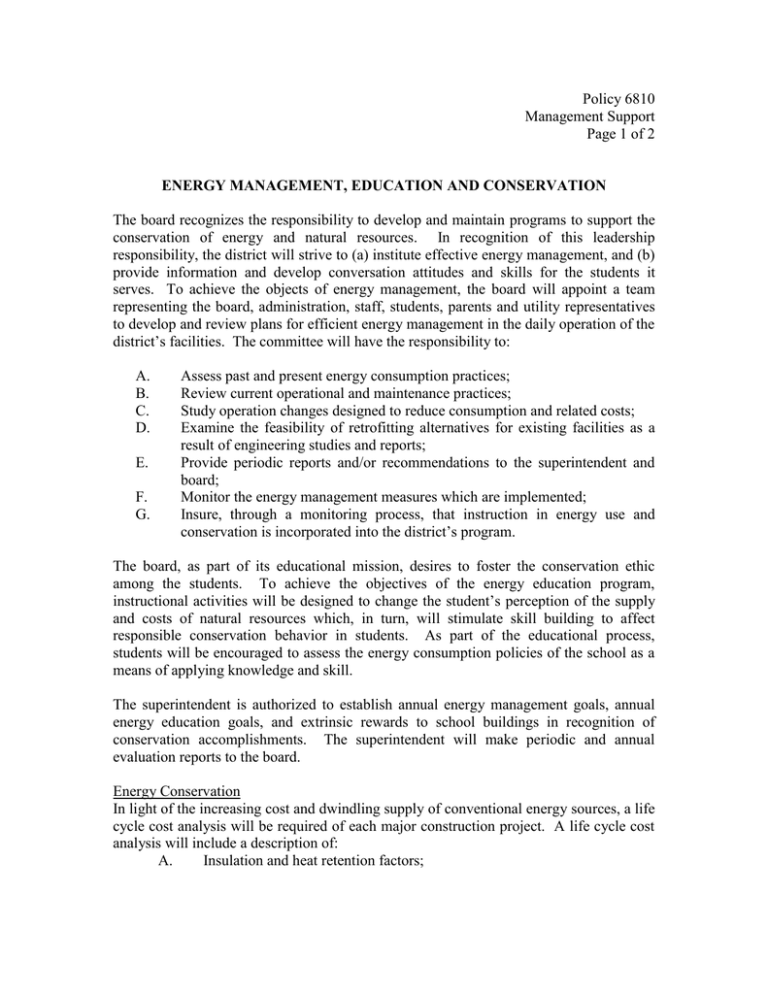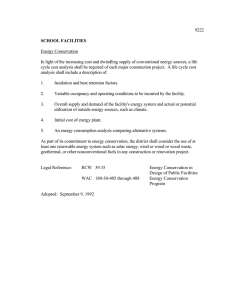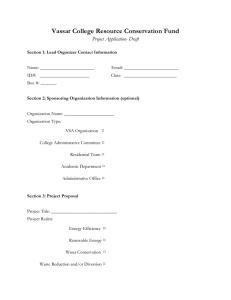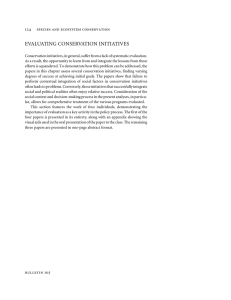Policy 6810 Management Support Page 1 of 2
advertisement

Policy 6810 Management Support Page 1 of 2 ENERGY MANAGEMENT, EDUCATION AND CONSERVATION The board recognizes the responsibility to develop and maintain programs to support the conservation of energy and natural resources. In recognition of this leadership responsibility, the district will strive to (a) institute effective energy management, and (b) provide information and develop conversation attitudes and skills for the students it serves. To achieve the objects of energy management, the board will appoint a team representing the board, administration, staff, students, parents and utility representatives to develop and review plans for efficient energy management in the daily operation of the district’s facilities. The committee will have the responsibility to: A. B. C. D. E. F. G. Assess past and present energy consumption practices; Review current operational and maintenance practices; Study operation changes designed to reduce consumption and related costs; Examine the feasibility of retrofitting alternatives for existing facilities as a result of engineering studies and reports; Provide periodic reports and/or recommendations to the superintendent and board; Monitor the energy management measures which are implemented; Insure, through a monitoring process, that instruction in energy use and conservation is incorporated into the district’s program. The board, as part of its educational mission, desires to foster the conservation ethic among the students. To achieve the objectives of the energy education program, instructional activities will be designed to change the student’s perception of the supply and costs of natural resources which, in turn, will stimulate skill building to affect responsible conservation behavior in students. As part of the educational process, students will be encouraged to assess the energy consumption policies of the school as a means of applying knowledge and skill. The superintendent is authorized to establish annual energy management goals, annual energy education goals, and extrinsic rewards to school buildings in recognition of conservation accomplishments. The superintendent will make periodic and annual evaluation reports to the board. Energy Conservation In light of the increasing cost and dwindling supply of conventional energy sources, a life cycle cost analysis will be required of each major construction project. A life cycle cost analysis will include a description of: A. Insulation and heat retention factors; 6810 Page 2 of 2 B. C. D. E. Variable occupancy and operating conditions to be incurred by the facility; Overall supply and demand of the facility’s energy system and actual or potential utilization of outside energy sources, such as climate; Initial cost of energy plant; and An energy consumption analysis comparing alternative energy systems. As part of its commitment to energy conservation, the district will consider the use of at least one renewable energy system such as solar energy, wind, wood or wood waste, geothermal, or other nonconventional fuels in any construction or renovation project. Cross Reference: Board Policy 2030 Curriculum Development and adoption of instructional materials Legal Reference: Chapter 39.25 RCW Energy conservation in design of public facilities Adoption Date: January 28, 2003 Revised: August 28, 2012 Reviewed: November 7, 2013





